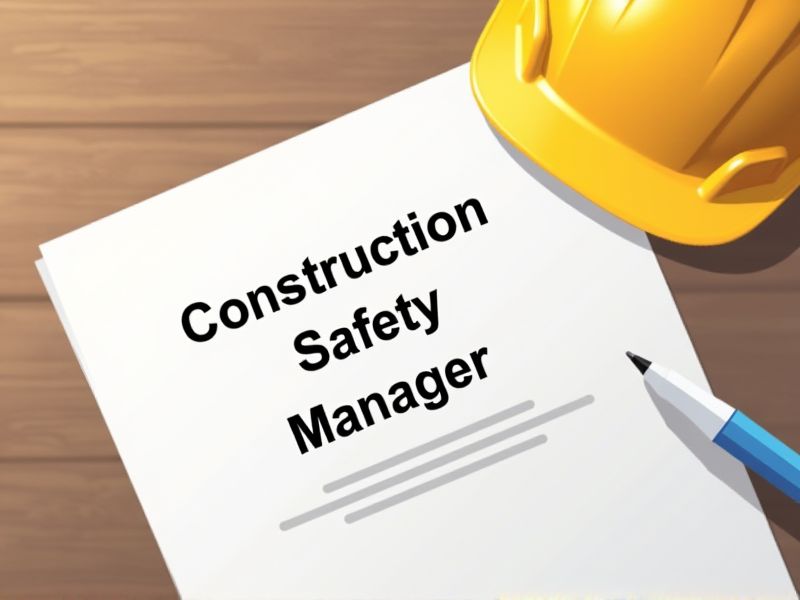
A Construction Safety Manager plays a vital role in ensuring compliance with safety regulations and preventing workplace accidents. Due to the high-risk nature of construction sites, having a solid foundation of specialized knowledge is crucial. Certain certifications validate a manager's expertise in identifying hazards and implementing safety protocols. Essential certifications may be required for a Construction Safety Manager to excel in their responsibilities.
OSHA 30-Hour Construction Safety Certification
Possessing an OSHA 30-Hour Construction Safety Certification ensures that Construction Safety Managers have comprehensive knowledge of federal safety regulations, reducing the likelihood of workplace accidents. This certification helps managers identify potential hazards and implement effective safety protocols, directly impacting the well-being of workers on site. Employers value this credential, as it often aligns with legal requirements and provides a competitive edge in project bids. The certification promotes a culture of safety, essential in minimizing legal liabilities and fostering employee trust.
OSHA 10-Hour Construction Safety Certification
OSHA 10-Hour Construction Safety Certification provides Construction Safety Managers with essential knowledge of federal safety regulations, increasing their ability to manage risk effectively on-site. This certification helps reduce workplace accidents, which can decrease legal liabilities and associated costs. Having certified managers fosters a safety-oriented culture, leading to improved worker morale and productivity. Being certified enhances the credibility and employability of managers, making them valuable assets to construction firms.
Certified Safety Professional (CSP)
Construction sites inherently pose numerous hazards, leading to a higher risk of accidents. Having a Certified Safety Professional (CSP) designation ensures that the Safety Manager is equipped with up-to-date knowledge and skills to anticipate and mitigate such risks. This certification also demonstrates a commitment to maintaining a high standard of safety, which can enhance worker confidence and morale. Employers often prefer or require CSP credentials, as they contribute to better compliance with regulatory standards and reduce the likelihood of costly incidents.
Construction Health and Safety Technician (CHST)
Hiring a Construction Health and Safety Technician (CHST) greatly supports a Construction Safety Manager by tackling daily safety inspections and ensuring compliance with OSHA regulations. The CHST helps identify potential hazards, which allows the Safety Manager to focus on broader safety strategy development and implementation. With a dedicated CHST, the construction team experiences a reduction in workplace incidents, contributing to project efficiency and cost savings. The partnership between a CHST and Safety Manager fosters a culture of safety, ultimately preserving both personnel well-being and public trust.
Certified Construction Manager (CCM)
Certified Construction Managers (CCM) possess validated expertise that enhances the overall safety management on construction sites. Having a CCM on board can lead to adherence to safety regulations, thereby reducing incidents and injuries. Effective risk assessment and management become more streamlined with a CCM's strategic foresight and decision-making skills. Their specialized training ensures a proactive approach to mitigating potential safety hazards, which promotes a safer working environment.
NEBOSH National General Certificate in Occupational Health and Safety
The NEBOSH National General Certificate provides essential knowledge on regulatory requirements and best practices in occupational health and safety, crucial for managing risks in construction sites. A Construction Safety Manager equipped with this certificate can identify and mitigate hazards effectively, reducing the likelihood of workplace accidents. Employers often prefer or require this certification as it demonstrates a commitment to maintaining safe working environments and compliance with legal standards. The qualification also enhances a manager's credibility, supporting career advancement in the highly regulated construction industry.
HAZWOPER Certification
HAZWOPER Certification is essential for a Construction Safety Manager because it ensures they understand the protocols for handling hazardous substances, which are often present on construction sites. This certification reduces the risk of exposure to dangerous chemicals, enhancing worker safety and compliance with OSHA regulations. By having the certification, the manager demonstrates their competence in emergency response and decontamination procedures. Proper training in hazardous waste operations minimizes costly accidents and legal liabilities.
First Aid, CPR, and AED Certification
Construction sites inherently carry high risk due to the nature of the work and equipment used, increasing the likelihood of accidents and medical emergencies. A Construction Safety Manager with first aid, CPR, and AED certification can respond quickly to medical incidents, potentially saving lives or minimizing injury severity. Certification enhances the manager's ability to implement effective safety protocols, thereby reducing overall site accident rates. Training ensures compliance with safety regulations, which not only protects workers but also mitigates potential legal liabilities for the company.
Fall Protection Certification
Construction projects regularly involve working at heights, necessitating stringent safety protocols to prevent accidents. Fall protection certification equips construction safety managers with the necessary knowledge and skills to implement these protocols effectively. Without proper certification, the risk of falls increases, potentially leading to severe injuries or fatalities on site. In compliance with regulations, certified managers ensure that safety measures align with legal requirements, reducing liability for construction companies.
Certified Safety and Health Manager (CSHM)
The complexity and inherent risks in construction projects necessitate a Certified Safety and Health Manager (CSHM) to identify and mitigate potential hazards effectively. With their specialized training, CSHMs can develop comprehensive safety programs that ensure adherence to industry standards and regulations. By systematically analyzing workplace risks, they reduce the likelihood of accidents, which can lead to decreased operational downtime and financial losses. Their expertise in safety management systems contributes to fostering a culture of safety, which can enhance overall productivity and employee morale on construction sites.
Summary
By obtaining certifications, you enhance your credibility and trust within the construction industry. This leads to improved job opportunities and potentially higher salaries due to your validated expertise. Certified Construction Safety Managers often implement more effective safety protocols, reducing workplace accidents. Consequently, project efficiency and compliance with regulations generally improve, benefiting overall project outcomes.
